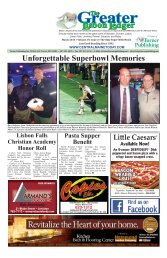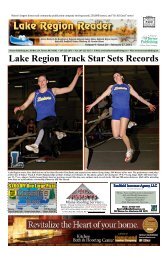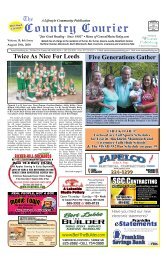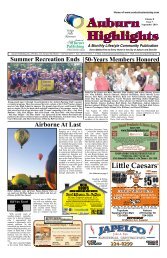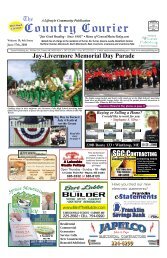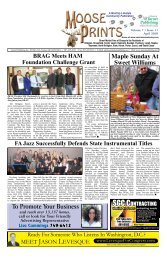Oxford Hills Observer - Turner Publishing, Inc.
Oxford Hills Observer - Turner Publishing, Inc.
Oxford Hills Observer - Turner Publishing, Inc.
Create successful ePaper yourself
Turn your PDF publications into a flip-book with our unique Google optimized e-Paper software.
April 2013 <strong>Oxford</strong> <strong>Hills</strong> <strong>Observer</strong> Page 13<br />
www.turnerpublishing.net<br />
The Healthy Geezer<br />
By Fred Cicetti<br />
Q. I usually get a bit<br />
light-headed when I stand,<br />
but this feeling is much<br />
worse when I get up from<br />
the dinner table. I don’t<br />
drink. Any ideas?<br />
There’s a possibility you<br />
have “postprandial hypotension,”<br />
or, in layman’s<br />
language, low blood pressure<br />
after a meal. This is a<br />
senior malady; few younger<br />
people experience this.<br />
Other possible symptoms<br />
include dizziness, blurred<br />
vision, nausea and fainting.<br />
I recommend going to a<br />
doctor to have your symptoms<br />
checked.<br />
When you eat, blood<br />
pours into your digestive<br />
system. To maintain your<br />
blood pressure, your heart<br />
pumps more often and your<br />
blood vessels constrict.<br />
But these compensatory<br />
mechanisms don’t work for<br />
some people.<br />
To help prevent postprandial<br />
hypotension, eat<br />
small portions several<br />
times a day and limit highcarbohydrate<br />
foods such<br />
as potatoes, rice, pasta and<br />
bread.<br />
There’s another form of<br />
low blood pressure called<br />
“postural hypotension”<br />
that affects some people<br />
when they stand up. Also<br />
called “orthostatic hypotension,”<br />
this is especially<br />
common in older adults<br />
who are more likely to use<br />
high blood pressure drugs.<br />
When you experience postural<br />
hypotension, blood<br />
pools in your legs.<br />
Low blood pressure is<br />
commonly caused by drugs<br />
for high blood pressure,<br />
surgical medications, antianxiety<br />
agents, diuretics,<br />
heart medicines, antidepressants,<br />
narcotic painkillers<br />
and alcohol.<br />
Other causes of low<br />
blood pressure include dehydration,<br />
heart failure,<br />
heart arrhythmias, shock<br />
from infection, stroke, severe<br />
allergic reaction, major<br />
trauma, heart attack and<br />
advanced diabetes.<br />
The effects of hypotension<br />
can lead to falls, which<br />
can be serious for seniors.<br />
Here are some pointers for<br />
avoiding the dangers of low<br />
blood pressure:<br />
When arising, let your<br />
feet hang over the side of<br />
your bed. Then flex your<br />
toes up and down about<br />
a dozen times. Stand up<br />
slowly. Count to 10 before<br />
you start walking. This is<br />
a good idea whenever you<br />
get up from lying or sitting<br />
for more than 20 minutes.<br />
Crossing your legs while<br />
sitting upright may also<br />
help increase blood pressure<br />
Some experts define low<br />
blood pressure as readings<br />
lower than 90 systolic (the<br />
first number) or 60 diastolic<br />
(the second number).<br />
However, low blood pressure<br />
is relative, so doctors<br />
often define blood pressure<br />
as too low only if there are<br />
symptoms.<br />
In many instances, low<br />
blood pressure isn’t serious.<br />
Wiles Garage & Body Shop<br />
65 Years in Business<br />
YOUR ONE STOP SHOP! HOP!<br />
However, it is important to<br />
see your doctor if you have<br />
hypotension symptoms, because<br />
they sometimes can<br />
point to serious problems.<br />
Chronic low blood pressure<br />
may increase the risk of<br />
Alzheimer’s-type dementia<br />
in some older adults.<br />
Low blood pressure<br />
without symptoms rarely<br />
requires treatment. In<br />
symptomatic cases, doctors<br />
address the primary problems<br />
such as heart failure.<br />
When hypotension is druginduced,<br />
treatment usually<br />
involves altering the drug<br />
regimen.<br />
It is possible to raise<br />
blood pressure when that<br />
is required. Here are some<br />
ways:<br />
• Eating more salt. However,<br />
too much sodium can<br />
cause heart failure, especially<br />
among seniors. Don’t<br />
increase your salt without<br />
consulting with your doctor.<br />
• Drink more water. Fluids<br />
increase blood volume<br />
and help prevent dehydration.<br />
• Compression stockings<br />
used to treat varicose veins<br />
may help reduce the pooling<br />
of blood in your legs.<br />
• There are also medications<br />
your doctor may prescribe.<br />
If you would like to read<br />
more columns, you can order<br />
a copy of “How to be<br />
a Healthy Geezer” at www.<br />
healthygeezer.com. n<br />
Junior Achievement of Maine: 25 Bibs<br />
for 2013 TD Beach to Beacon Road Race<br />
In 2010 Junior Achievement<br />
of Maine was named<br />
the beneficiary of the TD<br />
Beach to Beacon Race, because<br />
of this JA of Maine has<br />
been given the opportunity<br />
to purchase 25 bibs and sell<br />
them in exchange for fundraising.<br />
We are asking our<br />
runners to raise a minimum<br />
of $350 to support our finan-<br />
cial literacy and work readiness<br />
programs we provide<br />
schools across the State free<br />
of charge.<br />
Fundraising is simple; runners<br />
can create a donation<br />
page by using our fundraising<br />
platform, FirstGiving.<br />
This allows runners to create<br />
a page and receive secure donations<br />
on-line. We have al-<br />
ready sold a handful of bibs,<br />
so don’t wait if you are interested<br />
in running!<br />
Those interested in a<br />
Beach to Beacon bib should<br />
contact Michelle Anderson<br />
at 347-4333 or email at manderson@jamaine.org<br />
For more information, visit<br />
our website at www.jamaine.<br />
org. n<br />
FREE<br />
INSURANCE<br />
ESTIMATES<br />
•Alignments<br />
•Oil Changes<br />
•Transmissions<br />
•Brakes<br />
Kevin Wiles, Owner •Body Work<br />
246 Main St., Norway • 743-8482 • 1-800-540-8482<br />
Wiles<br />
First Lady LePage Cuts Ribbon On<br />
New Caring Alzheimer’s Facility<br />
First Lady Anne LePage makes comments to the public with Julie and Mike Benecke of<br />
Bedside Manor at the Grand Opening and Ribbon Cutting held March 20th.<br />
With Maine’s aging population,<br />
one of the toughest<br />
challenges a family can<br />
encounter is Alzheimer’s.<br />
More than 5 million Americans<br />
currently have the disease.<br />
By 2025, that number<br />
is expected to balloon to<br />
over 7 million. Unlike heart<br />
disease or diabetes, Alzheimer’s<br />
can’t be treated with<br />
diet and exercise. Treatments<br />
and medications for<br />
Alzheimer’s continue to be<br />
few and far between.<br />
It has been said that<br />
while this disease is deadly<br />
for the victim, it’s devastating<br />
for the family. Th e diffi -<br />
culty of caring for a person<br />
they love, while simultaneously<br />
watching them deteriorate<br />
can be relenting<br />
as things that used to take<br />
a few minutes can take all<br />
day. Ultimately turning into<br />
situations where the home<br />
is just no longer suitable or<br />
safe for the care of patients.<br />
Julie Benecke of Bedside<br />
Manor in Oakland, Maine<br />
has seen this devastation<br />
twice in her lifetime; First<br />
with her Grandmother and<br />
now currently with her<br />
own mother. Despite every<br />
eff ort to fi nd the best long<br />
term care, she found herself<br />
disillusioned with every option<br />
available for her mom.<br />
So she and her family built<br />
their own.<br />
“Bedside Manor has<br />
allowed us to fi ght back<br />
against Alzheimer’s disease<br />
and create something positive<br />
out of this personal experience<br />
with our Hero, our<br />
mom. We know fi rst-hand<br />
the stress, frustration, exhaustion,<br />
anxiety and overall<br />
sadness families and<br />
caregivers go through when<br />
caring for a family member<br />
with Alzheimer’s or dementia,”<br />
says Benecke. “Our<br />
promise at Bedside Manor<br />
is to treat our resident’s as<br />
family and to make every<br />
day special for them.”<br />
When someone in your life has Alzheimer’s,<br />
the questions keep coming.<br />
We help you fi nd answers.<br />
Long-Term Residential Care<br />
Respite Care<br />
Adult Day Service<br />
207-465-2527<br />
www.BedsideManorCare.com<br />
Bedside Manor was visited<br />
by First Lady Anne LePage<br />
to celebrate their grand<br />
opening on March 20th.<br />
“I’m so impressed with<br />
what this family has done<br />
in creating Bedside Manor.<br />
Th ey have taken the level<br />
of care they want for their<br />
own mother and are now<br />
off ering it to other families<br />
struggling with Alzheimer’s<br />
disease. Th is is the ultimate<br />
gift of love to not only their<br />
mother, but to the people of<br />
Maine,” said Anne LePage.<br />
In addition to long term<br />
care, Bedside Manor also<br />
off ers Respite Care to help<br />
families struggling with the<br />
disease as it progresses.<br />
If you or a friend are<br />
facing challenges due to<br />
Alzheimer’s, the staff at<br />
Bedside Manor are eager<br />
to discuss how they might<br />
be of service. Th ey can be<br />
reached at 207-465-2527 or<br />
at their website, www.bedsidemanorcare.com.



